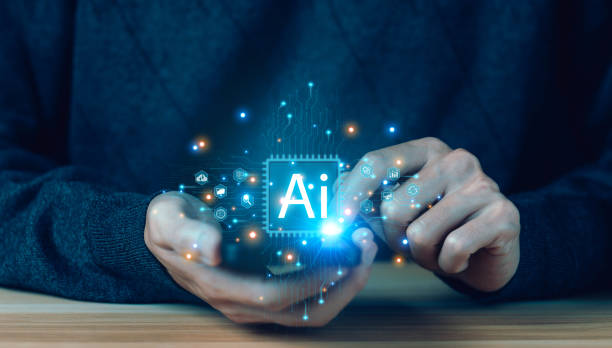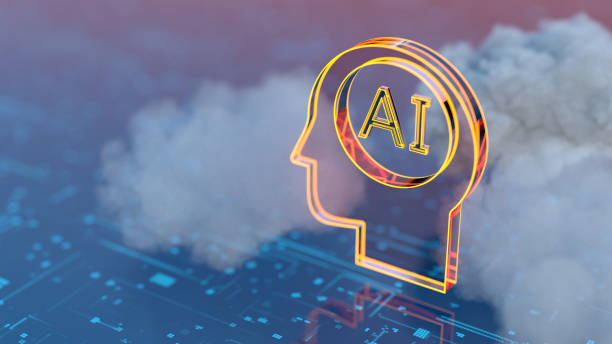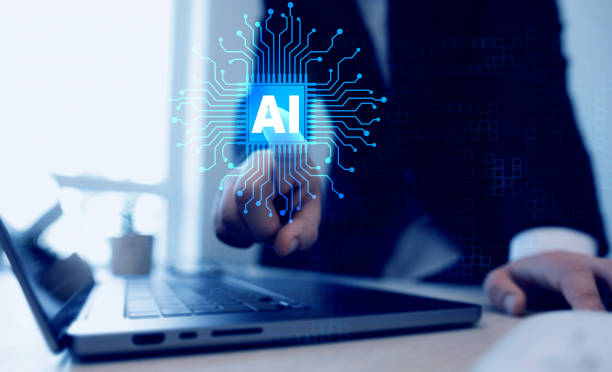An Introduction to What is Artificial Intelligence?

#Artificial_Intelligence, or Artificial Intelligence (AI), is a branch of computer science that deals with building systems capable of performing tasks that typically require human intelligence.
This broad definition includes a wide range of capabilities, from learning and problem-solving to language comprehension and pattern recognition.
The main goal of AI development is to create machines that can think, reason, and even be creative like humans.
The nature of AI is not limited to robots; it is hidden behind many applications and services we use daily.
This technology not only helps automate repetitive tasks but also significantly enhances our abilities in analyzing complex data and making better decisions.
With AI, we can solve problems that previously seemed impossible. This section serves as an explanatory and educational introduction to familiarize readers with the fundamental concepts of this field.
A correct understanding of AI fundamentals is the first step towards a deeper comprehension of its potential and challenges.
This technology promises significant changes in various aspects of our lives, from medicine to transportation and education.
AI’s potential for endless innovation has made it one of the most exciting and important areas of research and development in the current era.
Does your current website display your brand’s credibility as it should? Or does it drive away potential customers?
Rasaweb, with years of experience in professional corporate website design, is your comprehensive solution.
✅ A modern, beautiful website tailored to your brand identity
✅ Significant increase in lead generation and new customers
⚡ Contact Rasaweb now for a free consultation on corporate website design!
History and Evolution of Artificial Intelligence

#AI_Evolution has a long and tumultuous history, starting from the early ideas of ancient Greek philosophers and continuing to the advent of today’s supercomputers.
However, the formal birth of the field of artificial intelligence dates back to the Dartmouth Conference in 1956, where John McCarthy first coined the term “Artificial Intelligence.”
The 1950s and 1960s saw initial optimism and advancements in problem-solving and symbolic reasoning, but the 1970s and 1980s marked the period of “AI winters,” during which funding decreased and progress slowed.
The reason for this stagnation was hardware limitations and the inability of systems at the time to manage large volumes of data and real-world complexities.
But with significant advancements in computational power and access to big data in the 21st century, AI surged again. The emergence of machine learning, especially deep learning and neural networks, was a crucial turning point that enabled the processing of vast amounts of information and the identification of complex patterns.
This period was accompanied by numerous #news reports of new AI capabilities in areas such as natural language processing and machine vision.
These advancements transformed the explanatory path of artificial intelligence from a theoretical concept into a practical and powerful tool, making it one of the most important technologies of our time.
Types of Artificial Intelligence and Its Applications

#AI_Categorization is often based on their capabilities and complexity.
Generally, artificial intelligence is divided into three main categories: Narrow AI (ANI) or Weak AI, which is skilled at performing a specific task; Artificial General Intelligence (AGI) or Strong AI, which is capable of understanding, learning, and performing any intellectual task a human can; and Artificial Superintelligence (ASI), which surpasses human intelligence in all aspects.
Currently, all existing AI systems fall into the ANI category, but research to achieve AGI and ASI continues.
This educational and specialized section guides you through the applications of artificial intelligence in daily life and various industries.
Important subfields of AI include Deep Learning, Natural Language Processing (NLP), Computer Vision, and Robotics.
Each of these subfields has unique applications in various industries, from diagnosing diseases in medicine to developing self-driving cars and recommendation systems.
AI’s potential for transforming industries is endless.
| Type of Artificial Intelligence | Subfield/Related Concept | Practical Examples |
|---|---|---|
| Narrow AI (ANI) | Machine Learning (ML), Deep Learning (DL) | Voice assistants (Siri, Alexa), Recommendation systems (Netflix), Facial recognition |
| Natural Language Processing (NLP) | Text analysis, Machine translation | Chatbots, Email spam filters, Text summarization |
| Computer Vision (CV) | Image processing, Object detection | Self-driving cars, Medical diagnosis (imaging), Security surveillance |
| Robotics | Industrial automation, Service robots | Production line robots, Surgical robots, Explorer robots |
| Expert Systems | Knowledge-based, Logical rules | Fault diagnosis systems, Decision assistants |
Challenges and Opportunities Facing Artificial Intelligence

#AI_Challenges: Alongside the countless opportunities this technology brings, it also raises complex issues that require deep discussion and consideration.
One of the biggest thought-provoking contents is the debate on ethics in AI; issues such as algorithmic biases, data privacy, and transparency in decision-making.
AI algorithms may inadvertently reproduce or even amplify existing biases in training data, leading to discrimination and inequality.
On the other hand, data privacy has become a serious concern with the increasing collection and analysis of personal information by intelligent systems.
Another challenge is an analysis of AI’s impact on the job market; will widespread automation lead to mass unemployment or create new job opportunities? These are questions whose answers can shape the future of society.
However, the opportunities presented by AI are also very significant.
From improving disease diagnosis and treatment with AI in medicine to optimizing energy consumption and combating climate change, this technology has the potential to solve many of humanity’s greatest problems.
Responsible and ethical AI development is key to fully harnessing these opportunities and mitigating their potential risks.
Tired of losing customers due to poor e-commerce website design? With Rasaweb, solve this problem forever!
✅ Increase sales and visitor-to-customer conversion rates
✅ Smooth and engaging user experience for your customers⚡ Get free consultation
The Role of Artificial Intelligence in Daily Life

#AI_in_Daily_Life is more present than we think, and many of the tasks we perform daily are supported by this powerful technology.
From waking up with our smartwatches and asking for weather forecasts in the morning to watching a movie on online streaming platforms at night, the footprint of AI is clearly visible.
Voice assistants like Siri and Alexa, which can understand and respond to our voice commands, are clear examples of the application of natural language processing in AI that have made our lives more entertaining and convenient.
Recommendation systems in online stores and music/video streaming services also use AI algorithms to analyze our preferences and suggest relevant content, which significantly improves the user experience.
In healthcare, AI tools help doctors diagnose diseases faster and more accurately and even play a vital role in discovering new drugs.
Self-driving cars, still under development, are another example of the complex application of AI in computer vision and real-time decision-making, promising a major transformation in transportation.
This section, as a comprehensive guide, highlights the role of AI in improving quality of life and increasing efficiency in various aspects.
The Future of Artificial Intelligence and Predictions

#Future_of_AI is one of the hottest and most thought-provoking contents in scientific and technological communities.
Predictions about the future of this technology vary from achieving Artificial General Intelligence (AGI) to the potential for Artificial Superintelligence (ASI) and even the occurrence of Technological Singularity.
Technological Singularity refers to a hypothesis based on which AI can reach a point where it autonomously improves itself and grows beyond human comprehension.
This topic is both exciting and concerning, as it can lead to fundamental changes in society and human life.
Many experts provide an analysis of how AI development can help solve complex global problems such as environmental crises, incurable diseases, and poverty.
At the same time, there are concerns about the control and ethics of superintelligent AI.
These news and fascinating predictions show that the future of this technology is not limited to its computational capabilities but depends on how we interact with it and the decisions we make today.
AI’s role in the future will be increasingly defined by its interaction and collaboration with humans, rather than merely replacing them.
Impact of Artificial Intelligence on the Job Market and Global Economy

#AI_Economy is one of the most debated topics among policymakers and economists.
The rise of AI and relentless advancements in automation have raised serious questions about the future of the job market and the global economy.
On one hand, many are concerned about job losses due to the automation of repetitive and rule-based tasks by intelligent systems.
Jobs in manufacturing, customer service, and transportation industries may be most affected.
However, on the other hand, AI also brings new opportunities for creating fresh jobs and increasing productivity across various industries.
This section provides a precise and specialized analysis of how AI impacts various economic sectors.
Increased productivity from AI can lead to economic growth, but it requires investment in workforce retraining and the development of new skills so that individuals can adapt to changes.
For example, AI can optimize logistics and supply chain processes, leading to greater savings and efficiency.
| Sector/Industry | Impact of AI | Examples |
|---|---|---|
| Manufacturing and Industry | Automation, increased accuracy and speed | Assembly line robots, Predictive maintenance of machinery |
| Services and Marketing | Customer experience personalization, increased sales | Support chatbots, Product recommendation systems, Customer behavior analysis |
| Health and Medicine | Faster diagnosis, Drug discovery, Personalized treatments | Medical image analysis (MRI), Surgical assistants, Drug design |
| Finance and Banking | Fraud detection, Risk analysis, Financial advice | Detection of suspicious activities, Credit assessment, Investment advisor robots |
| Education and Research | Learning personalization, Student performance analysis, Research and Development | Adaptive learning platforms, Automatic exam grading, Pattern discovery in scientific data |
Cybersecurity and Artificial Intelligence

#AI_and_Cybersecurity are two sides of the same coin; on one hand, AI can be a powerful tool to strengthen cyber defenses, and on the other, it can itself be a target or a tool for complex attacks.
In the defense sector, AI systems can analyze vast amounts of data at unprecedented speeds and identify suspicious patterns or anomalies that indicate cyberattacks.
These capabilities are particularly effective in intrusion detection, malware prevention, and combating phishing attacks.
Machine learning algorithms can learn normal network behavior and detect any deviations as a potential threat.
This approach is particularly effective against unknown attacks (zero-day attacks) that lack specific signatures.
However, AI development by attackers is also possible.
Attackers can use AI to automate attacks, intelligent social engineering, and create more sophisticated malware that is difficult for traditional defense systems to detect.
This specialized and informative section highlights the importance of AI in this ongoing battle and emphasizes the need for continuous innovation on both fronts.
The future of cybersecurity increasingly depends on our ability to harness and responsibly use AI.
Did you know that 85% of customers check your company’s website before any interaction?
With Rasaweb, build a corporate website worthy of your credibility.
✅ Increase credibility and customer trust
✅ Attract high-quality leads
⚡ Get free website design consultation
Artificial Intelligence in Art and Creativity

#AI_Creativity is one of the most fascinating and controversial areas that artificial intelligence has entered.
For a long time, creativity was considered one of the unique features of human intelligence, but with the advancement of AI, the boundaries of this definition are changing.
Today, AI algorithms can produce works of art, music, poetry, and even screenplays.
By learning from vast datasets of artistic data, these systems are capable of generating new content that is sometimes difficult even for experts to distinguish from human works.
This capability of AI is entertaining and astonishing for many artists and art enthusiasts, opening new avenues for artistic expression.
For example, artists can use AI as an auxiliary tool for brainstorming, generating initial drafts, or even collaborating in the creation of works.
This section provides an analysis of the relationship between AI and creativity.
The main question is whether a machine can truly be “creative” or merely imitate and reproduce patterns.
This thought-provoking content questions the nature of creativity and compels us to redefine it.
However, what is certain is that AI has opened new doors to the world of art and creativity, offering unparalleled potential for artistic innovations in the future.
Ethics and Responsibility in Artificial Intelligence Development

#AI_Ethics and responsibility in its development and deployment are among the vital and thought-provoking contents in the current era.
As AI becomes more advanced and plays a role in more sensitive decisions, ensuring that these systems operate ethically, fairly, and transparently becomes increasingly important.
One of the main challenges is the issue of algorithmic biases.
If the data used to train AI contains social biases, AI systems will learn and apply these biases in their decisions, which can lead to discrimination in areas such as employment, loan granting, or even criminal justice.
Transparency and explainable Artificial Intelligence (XAI), meaning the ability to understand how an AI system makes a decision, are essential for increasing trust and accountability.
This section serves as a comprehensive guide to the ethical frameworks and responsibilities that AI developers and users must consider.
Establishing appropriate laws and regulations, creating ethical standards, and promoting research in responsible AI are fundamental steps to ensure the development and use of this technology benefits humanity.
This is an explanatory discussion to properly guide this field.
Frequently Asked Questions
| Question | Answer |
|---|---|
| What is the definition of Artificial Intelligence (AI)? | It is a field in computer science that aims to create intelligent machines capable of thinking, learning, problem-solving, and making decisions like humans. |
| Mention some common applications of artificial intelligence. | These include self-driving cars, voice assistants (such as Siri and Alexa), recommendation systems (such as Netflix and Amazon), facial recognition, and medical diagnosis. |
| What is the difference between Narrow AI (ANI) and Artificial General Intelligence (AGI)? | Narrow AI is specialized in one specific task, while Artificial General Intelligence possesses human-level intellectual ability to perform any cognitive task. |
| What is Machine Learning and its relationship with Artificial Intelligence? | Machine learning is a branch of artificial intelligence that focuses on developing algorithms that allow systems to learn from data without explicit programming. |
| What are Artificial Neural Networks? | They are computational models inspired by the structure and function of the human brain, used in deep learning to process data and discover complex patterns. |
| Mention some ethical challenges related to artificial intelligence. | These include privacy issues, bias in data and algorithms, job displacement, and accountability in case of errors or unfair decisions. |
| What is Natural Language Processing (NLP)? | It is a branch of artificial intelligence that focuses on enabling computers to understand, interpret, and generate human language in a useful and interactive way. |
| How can artificial intelligence affect the job market? | It can lead to the automation of some routine tasks, requiring worker retraining and creating new jobs in the fields of designing, developing, and maintaining AI systems. |
| What is Computer Vision? | It is a field in artificial intelligence that enables computers to “see,” understand, and interpret images and videos in the same way humans do, allowing them to recognize objects and faces. |
| What is the importance of data in developing artificial intelligence systems? | Data is the fuel that powers artificial intelligence systems, especially in machine learning. The quality and quantity of data significantly affect the accuracy and performance of models and their ability to learn and make correct decisions. |
And other services of Rasaweb Advertising Agency in the field of advertising
Smart Link Building: Designed for businesses seeking online growth through precise audience targeting.
Smart Custom Software: A dedicated service for increasing sales growth based on Google Ads management.
Smart UI/UX: An effective tool for increasing website traffic with the help of marketing automation.
Smart Customer Journey Map: A dedicated service for increasing website traffic growth based on intelligent data analysis.
Smart UI/UX: A combination of creativity and technology to improve SEO ranking through custom programming.
And over a hundred other services in the field of internet advertising, advertising consultation, and organizational solutions
Internet Advertising | Advertising Strategy | Advertorial
Resources
Where is AI taking the world’s future?
The Impact of Artificial Intelligence on the Future of Humanity – Donya-e-Eqtesad
The Impact of Artificial Intelligence on the Future of Humanity – IRIB News Agency
Artificial Intelligence and the Transformation of Human Life – Jamejam Online
? To advance your business in the digital space, Rasaweb Afarin Digital Marketing Agency is your trusted partner. With our services, from responsive website design to SEO optimization and social media management, your path to success will be smoother.
📍 Tehran, Mirdamad Street, next to Central Bank, Southern Kazeroun Alley, Ramin Alley, No. 6



